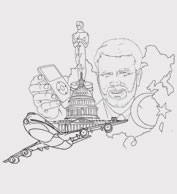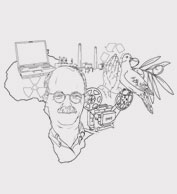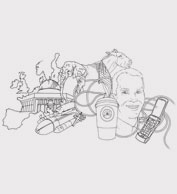STILLPOINT Archive: last updated 08/21/2007
Story Stan D. Gaede, James Davison Hunter '77 and Daniel C. Johnson
Illustration Grant Hanna '06
Stan Gaede, James Hunter '77 and Daniel Johnson have an unusual relationship spanning more than 30 years--a connection that has recently come full circle. The bare-bones account: Gaede, "fresh from doctoral studies at Vanderbilt," was Hunter's professor during Hunter's undergraduate years (1973-1977) as a sociology major at Gordon. Following doctoral work at Rutgers and a few other teaching stints, Hunter arrived at the University of Virginia in Charlottesville, where he met Johnson, a promising graduate student in sociology. Johnson now serves at Gordon as Sociology Department head and associate professor. And Gaede returned to Gordon in 2006 as scholar-in-residence after 10 years as provost and president of Westmont College in Santa Barbara, California.
These three scholars' curriculum vitae evidence a common and abiding interest in social theory--in those most basic questions, as Johnson phrases it, about "how people come to interpret the world, and how they interpret their experiences and actions within the world." As Christian sociologists they have taken on a particular responsibility, as Gaede puts it, not just to understand the forces of cultural change but "to bear witness to that understanding of culture so that we might be salt and light within it." And Hunter urges not just scholarly acumen but "disciplines of the inner life on the part of both the teacher and the student"--those classical disciplines of solitude and silence that are the necessary context for developing the sentinel-like vision of the true scholar.
Appropriately enough, this article was a collaborative project, sparked by Gaede's questions posed to himself and his colleagues: How did we become students of culture in the first place? What is it like to be always both a teacher and a learner? And what is the particular vocation of a Christian liberal arts college for these times?
STAN D. GAEDE, PH.D
How I became a student of culture is a bit of a mystery, but it probably had to do with my upbringing. I grew up in a Mennonite community, in a family that debated everything, during a time of extraordinary change and upheaval. Being Mennonite in California during the 60s was a cultural experience all by itself. Two things were critical, however. First, I saw the impact of a changing culture on friends, family and faith. And secondly, I realized that faith was not only shaped by culture but was one of the factors influencing cultural shifts. I started off thinking we were the victims of cultural change, but pretty soon began to see that we were the perpetrators as well. As a Christian I bore responsibility not only to understand these changes but to bear witness to that understanding of culture so we might be salt and light within it.
Gordon certainly takes the blame for a good bit of this realization since it was here I encountered both colleagues and students who pushed me in my own thinking. I arrived here in the mid-70s, fresh from doctoral studies at Vanderbilt, thinking I was ready to provide cultural instruction to the untutored. I was 27 years old, looked 19, and assumed I was God's gift to students. Turns out, I was the untutored. I learned more about my faith and my discipline--that was pivotal and life-changing--in the first decade at Gordon than at any time in my life. At 60 it's pretty clear that those same students were God's gift to me. And I don't just mean this in the sense that they have done well in so many different ventures. James Hunter '77, for example, was part of a group of students at Gordon during my first years as a professor. He and three of his friends (Bill Dawson '77, Brad Davis '76 and Robert Hanlon '77) were so eager to learn that one day they walked into my office and pretty much demanded that I acquaint them more fully with Jacques Ellul.
I wound up putting together a seminar just to get them out of my hair. But that seminar prompted a conversation on faith and culture like few I've had. It taught me about teaching as well--that "professor" is the exalted name we give to a very humbling craft in which daily one learns what one didn't know before, and often learns it from one's students. James Hunter. Christian Smith '82. Lawrence Holcomb '88. A thousand other students, doing all manner of things all over the world. And now, Daniel Johnson, my student's student--teaching me how much I have yet to learn--again.
Teaching, like everything else, has mirrored trends in the larger culture in becoming, over the years, more specialized, more designed to fit the particular needs of those involved. The typical professor does much more with much less, focusing on one area and going as deep as possible instead of wide. Students, too, can pick and choose, having a great variety of institutions and courses to select from. The really grand thing, however, is that from day one the Lord didn't give me those options. As an undergraduate at Westmont and then as a professor at Gordon, I was forced to go both deep and wide. In my first year teaching at Gordon, I was dumped in Byington Hall with only one other sociologist; the rest were psychologists, historians, political scientists and economists,
not to mention the personnel director and Business Office. Plus faculty from Frost and Emery Halls, who kept dropping by to inform me that my life without the humanities and the sciences was quite moribund.
So what happened? I read as much outside of my discipline as within it. Sat in classes taught by other profs. And team-taught a course on hermeneutics (post-foundationalism, we called it) with a philosopher, a mathematician, a psychologist and a political scientist. Where else in the world could one do that? The downside is that it got me so involved in the life of the College that I wound up taking excursions into administration. But even that helped me grow as a professor. Teaching was not about me or my discipline. It was about learning, and sharing what one learned with other learners.
JAMES DAVISON HUNTER, PH.D. '77
It's often said that scholarship is a veiled form of autobiography. That describes my story pretty well. My passion to understand culture was rooted in existential questions about the meaning of the modern world and how it was possible to live in the complexities of that world as a Christian. I arrived at Gordon in the fall of 1973 with a lot of questions. In Romans, for example, St. Paul writes, "Be not conformed to the patterns of this world." But what is the "world" that we are not to be conformed to? Given my Lutheran upbringing, I was naturally suspicious of the old evangelical claims that nonconformity to the world meant avoiding alcohol, dancing and the like. Gordon was a place I could ask the toughest questions about my time and myself, but in ways that encouraged rather than denied the relevance of faith.
Stan Gaede embodied the best of what Gordon had to offer students like me. Stan is a world-class teacher, but he also, along with Judy and his growing family, extended to me a friendship that showed me how the insights of the classroom could translate into the wisdom of everyday life. Stan's blending of theoretical perspicacity, historical analogy and the practical wisdom of our faith tradition is a lesson I've carried with me ever since.
Like Stan, I've learned much from my students over the years. I got to know Daniel Johnson when he was a first-year graduate student. Within a month of arriving at the University of Virginia, this freshly scrubbed young man became highly sought after as a teaching and research assistant. It was clear he had it all--theoretical acumen, methodological sophistication, a sharp, inquisitive and synthetic mind, high standards, a stunning work ethic and a big heart. Having young scholars like Daniel in the Sociology Department and at the Institute for Advanced Studies in Culture has always been my greatest privilege.
How has the culture changed? Certainly the roots of our present paradoxical situation trace back well over a century ago. Today the American economy remains robust, its technology is innovative, its polity generally stable and its political ideals still vibrant. That said, American political culture is fragmented and polarized, its commercial and entertainment culture ever more tasteless and vulgar, and its moral and intellectual culture ever more disjointed, incoherent, relativistic and superficial. The contradictions of our time are mystifying, perilous and endlessly fascinating. What a great time to be alive and to be a scholar.
What is teaching like in these times? Nowadays the pressures tend to push in opposite directions. The more gifted and ambitious students operate with higher and higher expectations and want a greater intensity to their education--I have been amazed at the level of sophistication among some undergraduates. At the same time there are greater pressures today to make the content of education more simplistic, the teaching more entertaining and every teacher an impresario. As Philip Rieff once said, "To conserve and transmit a vision of the highest, that is what is higher about education." But to do that effectively takes time, an absence of distraction, silence, as well as disciplines of the inner life on the part of both the teacher and the student. Sadly, these conditions and qualities are not easily found and not easily generated in our day.
One of the hallmarks of postmodernism, in fact, is the emptying of words of their meaning. Words can now be filled up with any meaning that suits us. Of course, I'm not just talking about words but of identity, systems of belief, codes of morality and even the practice of faith (isn't this why so many people have abandoned religion for "spirituality"?). They are all increasingly emptied of the binding particularities that make them authoritative. But living cultures only exist in their particularities. A place like Gordon can sustain the living tradition of Christian faith and thought, one in which the essential particularities of that tradition are a prism through which the most important aspects of reality are made sharper. In this sense, my view of Gordon is Augustinian--true knowledge, rather than being void of belief, in fact depends upon belief.
DANIEL C. JOHNSON, PH.D.
When I went off to college 20 years ago, I had no idea that I had a question--or even questions--that I needed help in answering. Perhaps because I come from a family of engineers, I approached my education in purely instrumental terms. I figured that once I entered the workaday world I would be called upon to find solutions to the problems that my employers presented to me. Accordingly, I looked to my college education to give me the problem-solving tools I would need. So what if I was more interested in social things than, say, building bridges or designing electronic control systems? I saw no reason to approach learning any differently on that account.
The college I attended generally affirmed such an instrumental approach to knowledge. By my third year, however, I was growing unaccountably dissatisfied with the tools I was being given. I shared my frustrations with an admired professor who responded by recommending works from strange disciplines like sociology and anthropology, which he apparently (and rightly) thought would stimulate my intellectual passions. When he placed in my hand a couple of books James Hunter had recently written on American evangelicals, I was hooked. Soon I was scouring their bibliographies for other works.
What I found in those works was a corrective. I realized that what I had been seeking was not tools for the solving of problems, but tools for the asking of certain kinds of questions. Graduate school was a natural next step for me as I sought to understand better how sociology might address the questions that drove me. There, under the more direct influence of James, I grew to appreciate how my own questions were related to the central question of all cultural study: how do people come to interpret the world, and how do they interpret their experiences and actions within the world?
Asking such a question in a sustained and disciplined way challenges our own understandings of reality, of the nature of faith, and of how we ought to live as adherents of a particular faith. In both formal and informal ways during my graduate school years, James provided spaces wherein I and others could wrestle with these kinds of concerns. On several occasions he spoke fondly of one who had done much the same for him: Stan Gaede. So, long before I ever met Stan I knew him as a teacher who challenged his students to explore what happens when a real commitment to a scholarly discipline intersects with a real commitment to following Jesus, because that is what I saw his own student doing with me.
It is not always easy to get students to take seriously the questions that sociology asks us. Some shudder to have their assumptions called into question by so irreverent a discipline. Others are disenchanted souls who have heard or seen enough to affect a cool detachment whenever tricky questions of meaning arise. In the short time I have been teaching, the first sort of student has become a little less prevalent and the latter sort a little more so. In either case, our challenge as educators is to get beyond these basic resistances, bringing such students to a point where they can ask their questions freely.
Then there are those students who, energized by what sociology asks of them, diligently pursue questions of their own devising as well as the more challenging questions of meaning that such pursuits frequently prompt. I am routinely encouraged by the number and quality of such students who crop up at Gordon. Like Stan and James, I have been blessed with more of them than I can name, and surely more than I deserve.
As Stan and James both point out, such students call us to join them as fellow learners. Their energies and passions can feed our own, which surely helps to keep us--and our teaching--vibrant and fresh. Coming alongside this kind of student can also be hard, even tedious, work. But when I consider how faithful Stan was to the exact same work, in the exact same place, some 30 years ago, and when I consider how profoundly, if indirectly, that work has shaped me, I cannot help but desire to carry it forward today.
Stan Gaede, Ph.D., is currently scholar-in-residence and senior advisor to the president at Gordon College. He was a member of the Sociology Department at Gordon for 22 years before serving as provost and then president at Westmont. The Gaede Institute for the Liberal Arts at Westmont was established in recognition of Gaede's work in promoting the vitality of the liberal arts tradition in American higher education. Gaede is the author of seven books including Surprised by God; When Tolerance Is No Virtue: Political Correctness, Multiculturalism and the Future of Truth and Justice; and An Incomplete Guide to the Rest of Your Life.
James Davison Hunter, Ph.D. '77, is LaBrosse-Levinson Distinguished Professor of Religion, Culture and Social Theory at the University of Virginia, and founder and director of the University's Institute for Advanced Studies in Culture. Hunter received the Ph.D. in sociology at Rutgers University, working with Peter Berger. He is the author of eight books including Evangelicalism: The Coming Generation; Culture Wars: The Struggle to Define America; and The Death of Character: Moral Education in an Age without Good or Evil. He is the founder of The Hedgehog Review: Critical Reflections on Contemporary Culture, and a member of the National Council of the National Endowment for the Humanities.
Daniel C. Johnson, Ph.D., is associate professor of sociology and department chair at Gordon. He holds the Ph.D. in sociology from the University of Virginia in Charlottesville, where he worked with James Davison Hunter. He joined the Gordon faculty in 1998. His primary research and teaching interests are in critical social theory and cultural sociology, although he also enjoys teaching statistics to the math-phobic. His current research projects focus on the construction of the idea of "calling" among ministry-oriented adolescents, on the nature of hope, and on narratives of civilizational decline. He received the Distinguished Junior Faculty Award in 2003.


